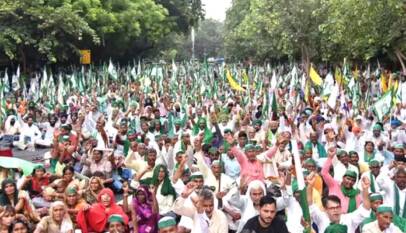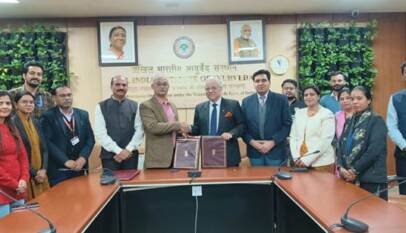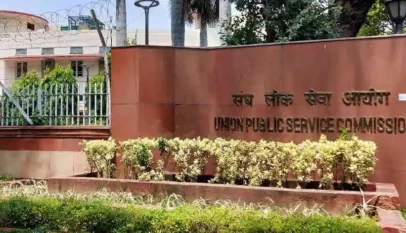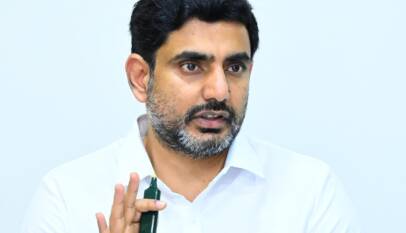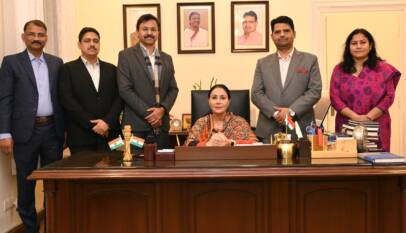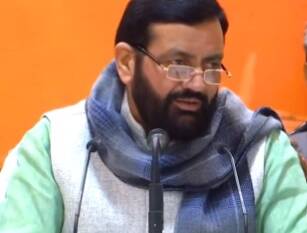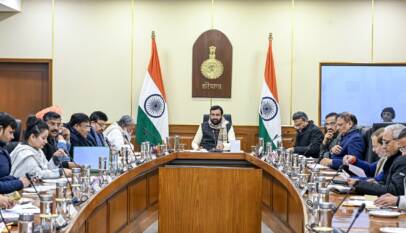Chief Minister distributes appointment letters to 647 forest guards/wildlife guards and 41 junior engineers
Lucknow : Emphasizing that climate change is the most significant concern for both the country and the world, Chief Minister Yogi Adityanath stated on Tuesday that the newly appointed forest and wildlife guards have a crucial role to play in mitigating its harmful effects.
While distributing appointment letters to 647 forest guards and wildlife guards, along with 41 junior engineers selected through the UP Subordinate Services Selection Commission at Lok Bhavan, the Chief Minister remarked, “Uncontrolled and unplanned development has created a crisis for humanity. We are witnessing untimely rains, excessive rainfall, and hailstorms, while at the same time, some areas suffer from drought and others from floods.”
He added, “In some regions, there is excessive rain, while in others, people are desperate for a drop of water—both situations are harmful. Today, we are all victims of the adverse effects of climate change. If the newly appointed forest and wildlife protectors work diligently and sincerely, they can significantly contribute to reducing these negative impacts.”

The Chief Minister noted that, in the past, it used to take about a year to receive the final appointment letter after an examination. However, with a renewed commitment, the government has now ensured that appointment letters are provided within six months/one year.
“From the beginning of the recruitment process to the distribution of appointment letters, there has been no need for recommendations or bribery. You must have seen that there is no scope for any unfair means to influence the examination, and the government expects you to maintain the same level of integrity in your work.”
Reflecting on the government’s progress over the past seven and a half years, the Chief Minister highlighted that the biggest challenges in combating climate change are deforestation, unplanned development, and the reckless use of plastic. He stressed that these practices can have disastrous effects on the environment.
“Even with efforts to curb these practices, misuse still happens at various levels. In hilly regions, forests can catch fire in any season, causing damage to the environment and triggering landslides. This not only affects wildlife but also has serious consequences for humans. The reduction in forest area is a key factor contributing to human-wildlife conflicts,” he added.
The Chief Minister emphasized that seven and a half years ago, the goal was set to increase forest cover, and significant strides have been made toward this target. “We plant trees on a large scale each year and have successfully completed the program of planting 210 crore trees. Our aim is to achieve 15 percent forest cover by 2028-29,” he stated.
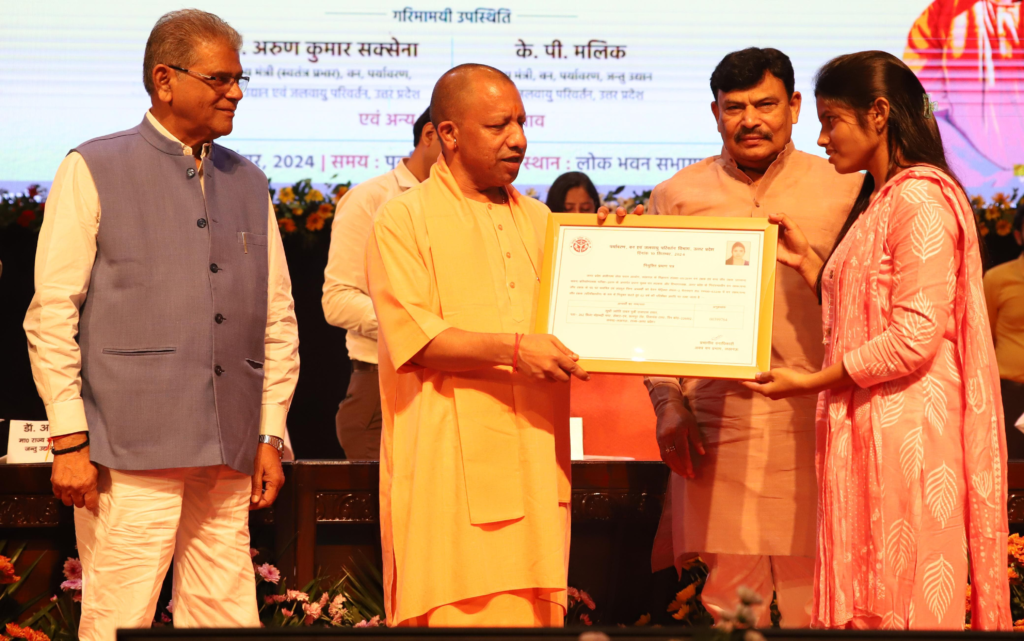
He further highlighted that while plantation is crucial, the protection of these forests relies on active public participation. Over the past seven and a half years, this approach has yielded positive results and garnered praise from international organizations. The involvement of farmers has been encouraged, and with the training of 647 new forest guards, a significant responsibility lies ahead, the CM pointed out.
The Chief Minister also noted the role of the Pollution Control Board in managing environmental responsibilities through public engagement. “Many of our rivers, which are vital water sources, were at risk,” he said. “To address this, PM Modi launched the Namami Gange program to ensure the Ganga remains uninterrupted and clean. This program needs to be expanded with public participation.”
Reflecting on recent incidents of human-wildlife conflicts, the Chief Minister noted that this season has seen increasing instances of wildlife becoming aggressive, leading to significant loss of life.
“This loss is deeply felt by families and society, often resulting in orphaned children and disrupted lives. When waterlogging or encroachment occurs in wildlife habitats, animals are forced to migrate, which impacts human settlements. Therefore, forest and wildlife guards must not only train themselves, but also educate local residents to act as guides,” he stated.
The Chief Minister also pointed out that the Terai districts, where these conflicts are occurring, are areas where forests and agricultural lands are in close proximity. Animals are drawn to fields when there is water in the forest, and sudden human presence can provoke wildlife aggression. He emphasized the need for electric and solar fencing in border areas to mitigate these conflicts.
The Chief Minister emphasized that solar fencing should be prioritized. He explained that when an animal encounters an electric shock, it will retreat, thereby safeguarding workers and farmers from harm. This measure can help prevent loss of life and protect farmers from wildlife aggression, reducing the risk of conflict.
Highlighting the interconnection between the human and animal lives, CM Yogi stated, “We cannot protect nature and the environment without recognizing this connection. All living beings rely on each other. It is crucial to halt illegal activities such as cutting and mining.”
He further noted that Uttar Pradesh is the first state to classify human-wildlife conflict as a disaster and allocate Rs 5 lakh for loss of life resulting from such conflicts. This provision also extends to deaths caused by snake bites, with funds available for the deceased’s dependents. Additionally, anti-snake venom is stocked in every district hospital and community health center.
CM Yogi also addressed the issue of illegal hunting, urging that action be taken against hunters who cross borders into Uttar Pradesh.
CM Yogi stated that plantation is not merely a program, but a crucial strategy for saving lives. “In the NCR region, from November to February, we often face criticism from the Supreme Court due to smog. The air quality in Delhi becomes so poor that respiratory patients are confined to their homes. The National Green Tribunal and the court address these issues seriously, as the environment there has suffered significantly. Forest cover has decreased, and rivers have become polluted, exacerbated by the burning of stubble after paddy harvests.”
He added, “To address this, bio-compressed units are being established. These units offer farmers additional income from stubble, alongside paddy. They also facilitate the purchase of stubble, providing farmers with a good price. The UP government, in collaboration with the Government of India, aims to set up 100 bio-compressed units, with several already operational. The Pollution Control Board and the New and Renewable Energy Department should expand these efforts further.”
He highlighted the state government’s efforts to ensure a transparent appointment process, noting the implementation of the Prevention of Unfair Means in Public Examination Act-2024. This law includes provisions for a fine of up to one crore rupees and life imprisonment for those involved in cheating, solver gangs, or paper leaks. To maintain examination integrity, AI technology and biometric recognition systems have been employed, and every examination center is monitored via CCTV from Lucknow.
Noting the recent successful completion of the recruitment exam for 60,200 police personnel, Yogi said, “This is likely the first time a civil police force anywhere in the world has conducted such a large recruitment process simultaneously without any issues. In the next six months, the UP Subordinate Service Selection Commission will process recruitment for an additional 40,000 positions.”
He also mentioned the formation of the UP Education Selection Commission, which will oversee recruitment to thousands of positions across basic, secondary, higher, vocational, and technical education sectors. The UP Public Service Commission is similarly accelerating its recruitment process and expanding government job opportunities for youth. Reforms have been implemented where necessary to support these efforts.
Reflecting on the situation prior to 2017, CM Yogi highlighted that among the 688 individuals appointed today, over 124 are women. He criticized the recruitment practices before 2017, stating that fair recruitment was not possible, with widespread doubts cast on the commissions and boards of that time. “Their work and selections were under suspicion, and many are still under CBI investigation. Those individuals did not operate with integrity,” he said.
Continuing his critique, CM Yogi pointed out that the inefficiencies of previous governments not only jeopardized the future of the youth but also led to a state of identity crisis. “Before 2017, when a youth from UP traveled outside the state and mentioned their origin, they often faced difficulties finding accommodations,” he said.
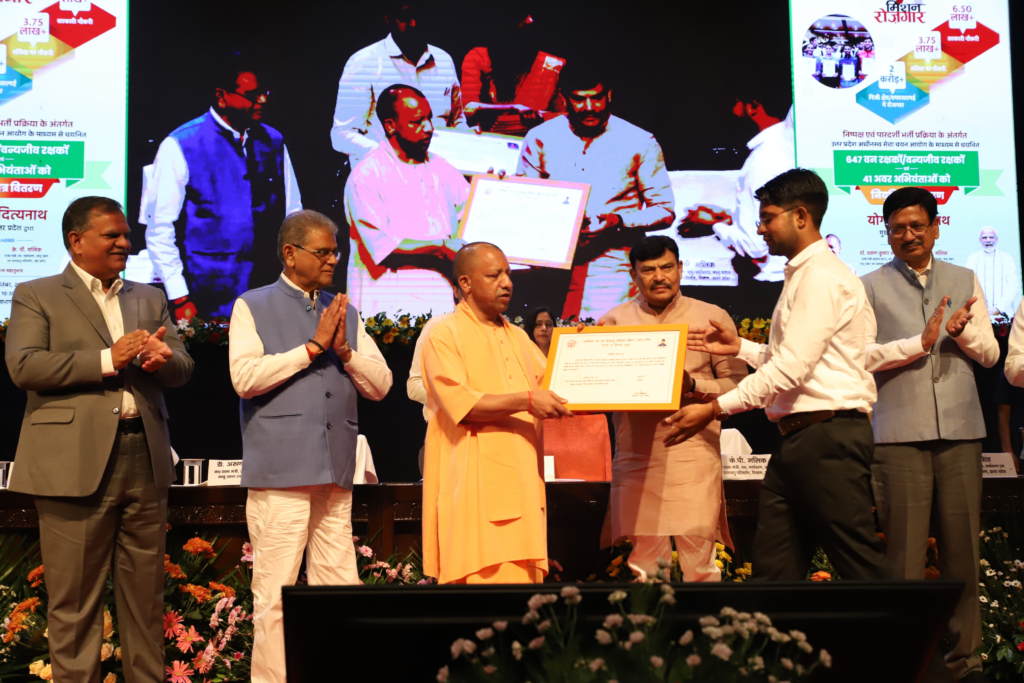
He further accused the former administration of creating this identity crisis and associating with leaders of the paper leak gangs. “After the recruitment process was revealed, lists of favored candidates were circulated, leading to corruption. This resulted in the exclusion of deserving and impoverished students and forced appointments through backdoor channels, causing immense distress and even leading some youths to commit suicide,” the Chief Minister asserted.
Attacking the opposition, CM Yogi Adityanath remarked that those who have never contributed positively will inevitably feel distressed when progress occurs. “They are being exposed for their failures and resort to spreading false propaganda. We should question them about their actions while they were in power. Why was the recruitment process not transparent? Why did the judiciary repeatedly have to intervene to halt the recruitment process?” he said.
CM Yogi highlighted that when his administration took office, there were 1.55 lakh vacant police posts, which were promptly filled within the designated timeframe. Additionally, 1.64 lakh teachers were recruited across various education levels. He said six and a half lakh youth secured jobs under his government.
He criticized the previous government’s approach to recruitment, accusing them of corruption and bribery. “Their identity was defined by these issues, but today the state is free from such practices. Corrupt elements have been brought under control. If a person from such a gang faces trouble, their leader will also be affected. When faced with issues, they often try to deflect blame. Even a criminal might initially deny guilt, but when presented with evidence, they admit their mistakes. The public continues to reject them, demonstrating their disapproval of past practices.”
CM Yogi Adityanath stated that these appointments mark the beginning of a new era for Uttar Pradesh. “This is the new Uttar Pradesh of a new India, which, prior to 2017, was a barrier to the country’s development. Today, it stands as a growth engine for India’s progress, aligning with PM Modi’s vision,” he said. He emphasized that every department shares a collective responsibility in achieving the goal of a one trillion-dollar economy.
The event was attended by Minister of State (Independent Charge) Dr. Arun Kumar Saxena, Minister of State KP Malik, Chief Secretary Manoj Kumar Singh, Additional Chief Secretary Manoj Kumar Singh, and Principal Chief Forest Conservator and Head of Department Sudhir Kumar Sharma, among others.
The following individuals received their appointment letters directly from the Chief Minister:
Shashi Tomar from Kanpur Dehat, Smriti Upadhyay from Ayodhya, Shikha Singh from Gonda, Abhinay Singh from Gorakhpur, Jyoti Rawat from Lucknow, Abhishek Tiwari from Prayagraj, Vishal Srivastava from Ayodhya, Abhishek Singh from Mau, Vijay Pratap Singh, Mohd. Naeem from Moradabad, Abhay Kumar Pandey from Lucknow, Sanjeev Yadav from Bareilly, Veer Bahadur Singh from Mirzapur, Arunesh from Sant Kabir Nagar, Vikas Singh from Pilibhit, Deepak Kumar from Ghazipur were given appointment letters. CM gave appointment letters to Pooja Tripathi of Fatehpur and Pawan Kumar of Hathras who were selected as junior engineers.
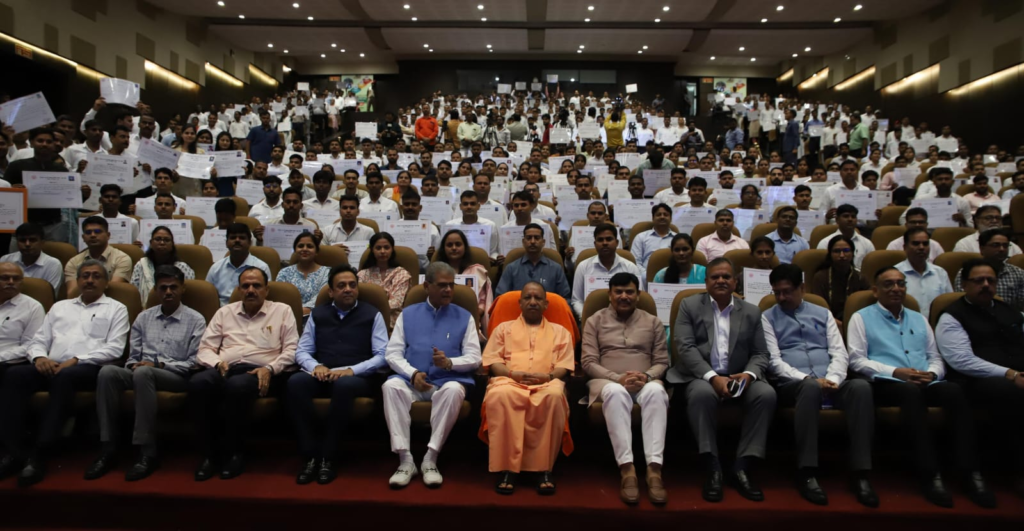
Andhra Pradesh Releases ₹1,200 Crore to Clear Scholarship and Fee Reimbursement Dues, Boosting Higher Education
In a major step to strengthen higher education and ease financial pressure on students, th…


